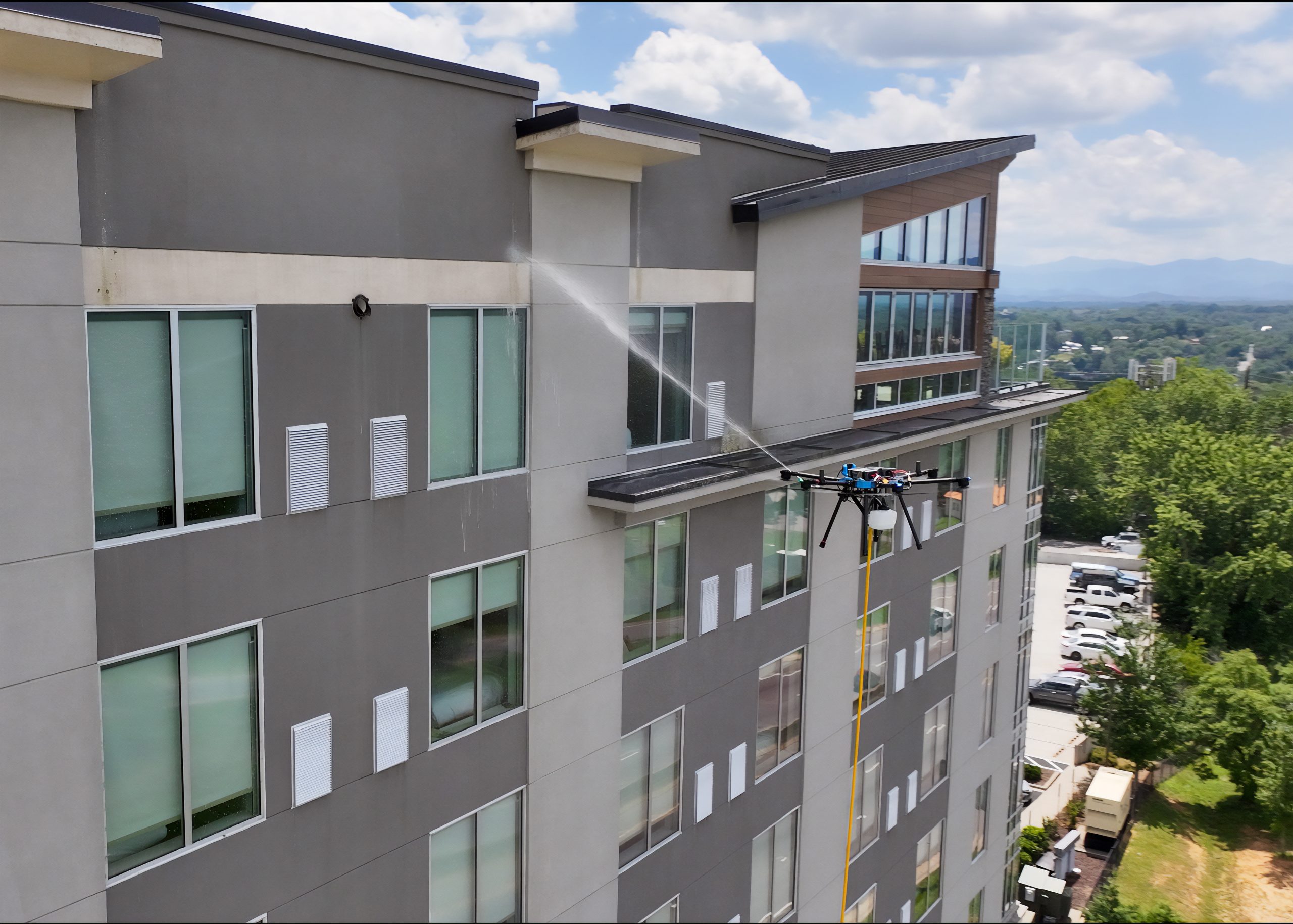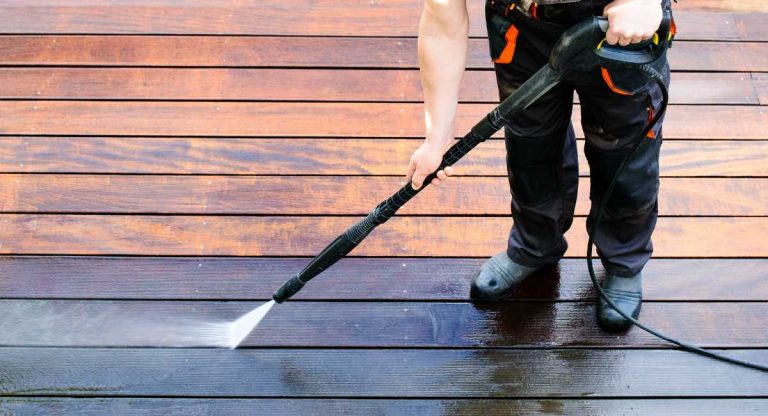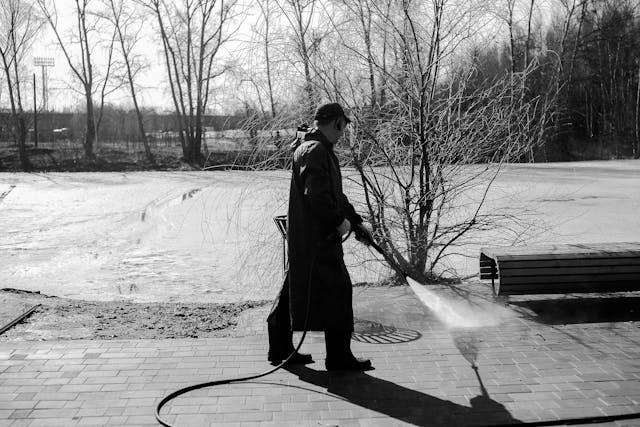
If you’ve ever tried to book a power washing service in a busy city, you may have noticed that prices are often higher than in nearby suburbs or rural towns. A job that might cost $250 in the suburbs could run you $400 or more downtown. But why? 🤔💵
It’s not price gouging — there are real factors that make power washing in urban environments more complex, time-consuming, and costly. Whether you’re a homeowner in a city condo or a commercial property manager on a busy street, here’s a breakdown of why power washing prices tend to be higher in urban areas. 🧼🏙️
🚗 1. Parking and Access Restrictions
One of the biggest challenges in urban power washing is simply getting to the job site.
In cities with:
- Limited or no street parking
- Permit-only zones
- Narrow alleys or one-way streets
- Height restrictions in garages
…contractors often have to park several blocks away and carry equipment on foot. That adds setup time, effort, and logistics — especially for larger machines or water tanks. 🅿️🚫
Some cities even require a parking permit for service vehicles, which adds extra fees the contractor must cover or pass along.
🏢 2. High-Rise and Multi-Unit Complexity
Urban environments often mean:
- Apartment buildings
- Multi-level condos
- Rooftop patios
- Balconies
- Shared exterior walls
These settings require special access methods like extension poles, scaffolding, boom lifts, or even rooftop anchor systems for safety. 🧗♂️💼
Additionally, multi-unit dwellings require:
- Coordination with building managers or HOAs
- Advance scheduling to notify tenants
- Strict hours to avoid disturbing neighbors
All of this adds complexity and time — which naturally increases the price.
🌬️ 3. Overspray and Nearby Property Risks
In tightly packed neighborhoods or downtown zones, there’s little space between buildings. That means power washing needs to be:
- Precisely controlled to avoid overspray onto neighboring properties
- Managed to prevent water runoff onto sidewalks or public areas
- Carefully monitored to avoid damage to cars, storefronts, or pedestrians
This higher level of risk and responsibility requires more experienced crews and liability coverage — both of which raise costs. 🎯🚶♂️💦
🧴 4. City Regulations and Environmental Compliance
Urban areas often have strict regulations about:
- Where water can drain
- What chemicals can be used
- How noise is controlled
- When work can be performed (e.g., no early mornings or late evenings)
Power washing companies in cities must often:
- Use eco-friendly, biodegradable cleaners
- Set up water containment systems
- Apply for permits before large jobs
- Follow local ordinances about runoff and disposal
These extra steps add both time and material costs, which are reflected in the pricing. 🌱📜
🕒 5. Slower Job Turnaround
Because of all the logistical challenges — from finding parking to navigating crowded sidewalks — a job that would take 2 hours in the suburbs might take 3–4 hours in the city.
For contractors, time is money. If a team can only complete two city jobs in a day compared to four suburban jobs, the price per job has to increase to cover their labor and overhead. ⏳📈
📞 6. Last-Minute Requests and Demand Surges
Urban areas tend to have higher demand for services, especially in the spring and summer. And with more people living in smaller areas, that demand can be concentrated and urgent:
- HOA violations with short notice
- Commercial storefronts prepping for weekend foot traffic
- Airbnb or short-term rentals needing cleaning between guests
When demand is high, and timelines are tight, prices go up. It’s simple supply and demand. 📞⚡
💼 7. Higher Insurance and Operational Costs
Operating in a city means:
- More liability risk (foot traffic, vehicles, high-rise buildings)
- Stricter insurance requirements
- Higher business licensing fees
- Additional permit requirements
All of these increase a company’s overhead — which gets factored into service pricing. A reputable company must be properly insured and compliant to protect both themselves and you. 🛡️📊
🧠 8. You’re Paying for Experience and Precision
Urban power washing isn’t something you want just anyone doing. It requires:
- Knowledge of pressure levels for delicate or historic materials
- Skill in confined spaces or rooftop setups
- Awareness of municipal rules and safety protocols
- Specialized equipment for tall or tight areas
When you pay a bit more for an urban-based or urban-experienced contractor, you’re not just paying for water pressure — you’re paying for expertise, safety, and reliability. 🎓💪
🔍 How to Maximize Your Value
Even if urban power washing costs more, you can still get great value. Here’s how:
- Bundle services: Ask if you can combine gutter cleaning, sidewalk washing, and siding into one package.
- Schedule in advance: Avoid peak season or rush fees by planning early.
- Ask about off-hour rates: Some companies offer lower pricing for late evening or early morning jobs.
- Get multiple quotes: Make sure the price you’re quoted reflects the actual scope of your job.
- Request insurance and permit documentation: Make sure you’re dealing with a legit professional.
🏁 Final Thoughts
Yes, hiring a power washing service in an urban area might cost a bit more — but there’s a reason for that. From access and logistics to regulation and risk, urban power washing requires more planning, more expertise, and often more time. 🏢💦
The key is finding a contractor who understands the unique challenges of city environments — and is fully prepared to clean your property safely, legally, and effectively. In the end, it’s about getting the job done right, not just cheaply.
Because in the city, every square foot of clean curb appeal counts. 🧼🌇✨
Browse Amazon Here For Top Rated Power Washers And Accessories






